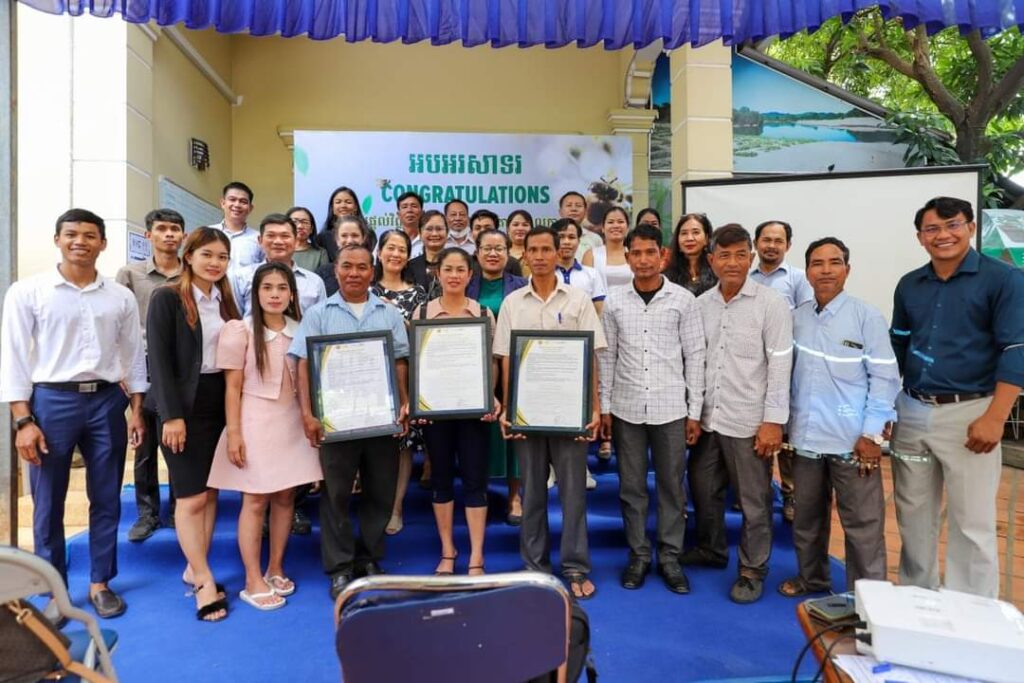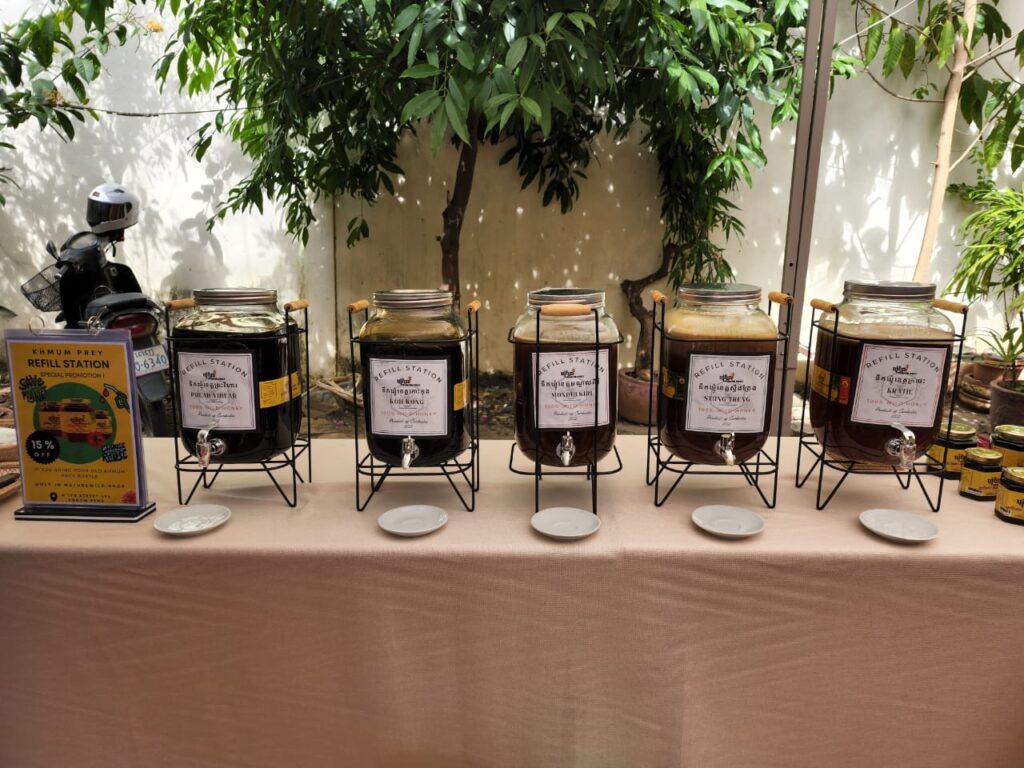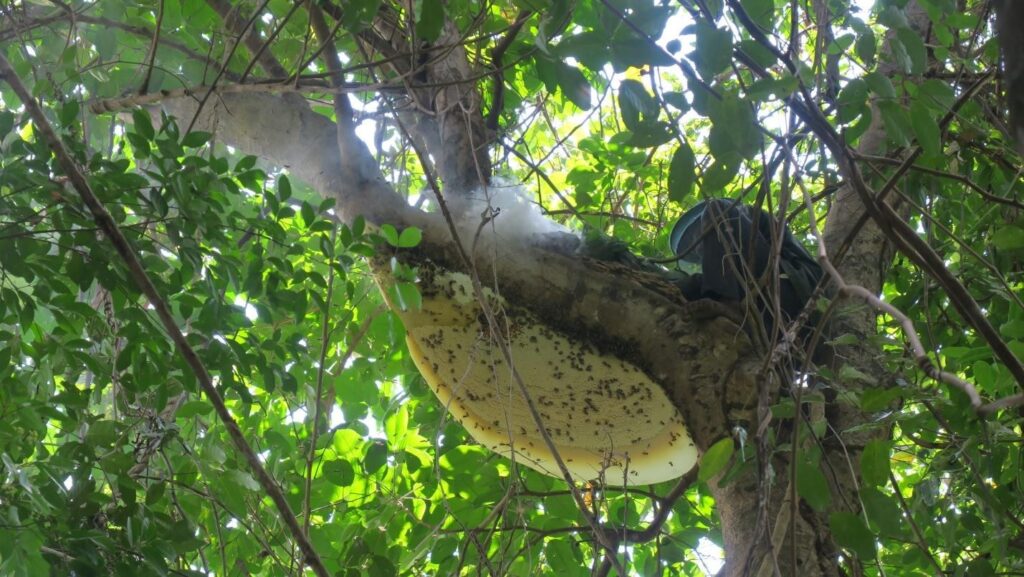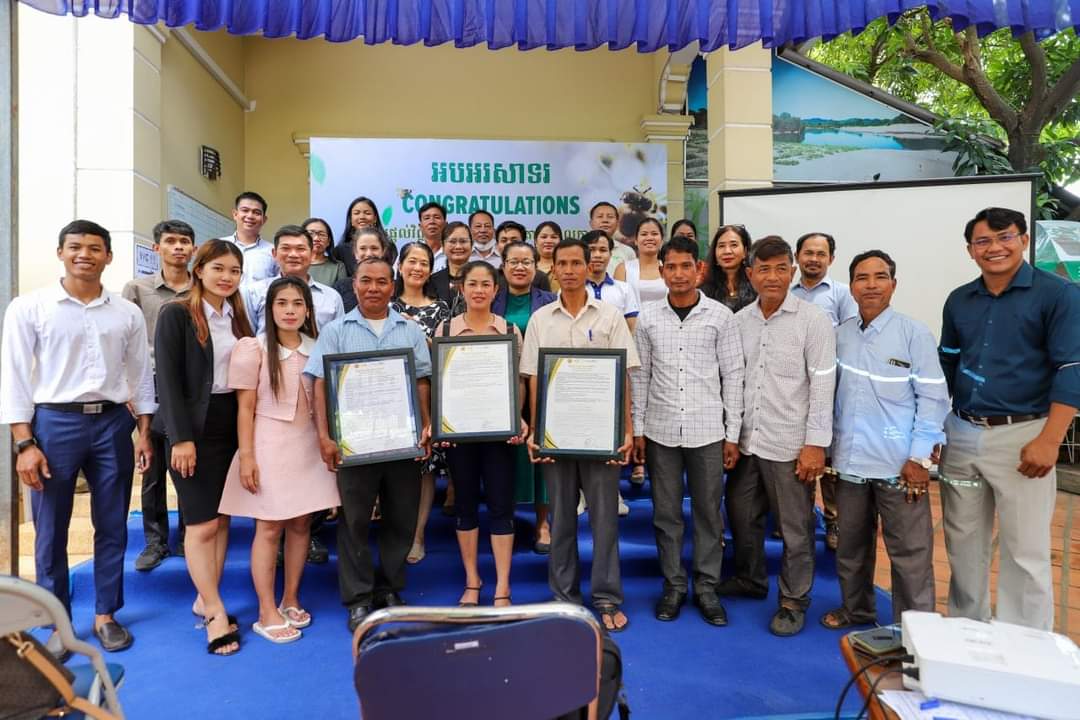
PHNOM PENH – Three members of the Cambodian Federation of Bee Conservation and Community-based Wild Honey Enterprises (CBHE) from Kratie, Prey Lang, and Stung Treng provinces received their Certificates of Compliance for the Khmum Prey wild honey protocols and standards in Phnom Penh on August 17, 2022.
The certificates were presented following two visits by an expert and peer external audit team to verify the members’ adoption of the Khmum Prey protocols and standards under the requirements of CBHE’s participatory guarantee system (PGS). Each CBHE member will be able to market their wild harvested honey under the Khmum Prey label.
The CBHE is Cambodia’s first wild honey network with 780 honey harvester members from six different provinces. CBHE’s network commits to the implementation of sustainable harvesting protocols and forest management practices and ensures fair price to honey gatherers and quality honey to consumers.
CBHE member harvesters and consolidators who comply with the standards under the Khmum Prey label receive a price premium of up to 30 percent. The Khmum Prey label guarantees that consumers are purchasing sustainably harvested wild honey that has been handled hygienically, does not contain any harmful chemicals, and can be traced to the Cambodian province of origin.
“We are pleased to confirm and verify our three members from the Prey Lang provinces of Kratie, Preah Vihear and Stung Treng. Our protocols and standards for sustainable forest honey collection still hold strong today,” said Khorn Sokhom, a honey harvester and trader from Mondulkiri an current president of CBHE.
“The trust-based relationships on which the wild honey groups and the honey value chain were established are still perceptible throughout the value chain. Presenting these CBHEs with their deserved certificates of compliance will give them the recognition and incentives for good practice that they deserve,” said Eric Guerin, sustainable beekeeping expert, native bee conservation advocate, and PGS peer auditor team lead.
With the support of USAID Greening Prey Lang, NatureWild Co. Ltd led the two compliance audits and provided technical advice as well as peer support to the CBHEs. The Certificate of Compliance received by each CBHE member applies to all of their harvested and processed wild honey products in accordance with the Khmum Prey protocols and standards. Other member verifications are currently in progress.
The Khmum Prey brand
Khmum Prey Wild Honey originates from five Cambodian provinces. Launched in 2010, each Khmum Prey jar contains sustainably harvested honey from Apis dorsata bees, also known as the giant Asian honey bee. With a known brand that represents sustainable, traceable, good quality, fairly priced and fairly traded forest honey, the CBHE collective mark – found in every jar of Khmum Prey wild honey – represents a collective practice captured in the Khmum Prey protocols and standards of sustainable harvesting of wild honey and management of apis dorsata bees and their forest habitats.

The Khmum Prey protocols and standards puts the knowledge of traditional honey hunters and collectors about the forest and the bees into a collective system and practice. It also indicates how both can be protected and sustained while ensuring that quality, healthy, pure, and natural wild honey is delivered and consumed by end consumers. With the assistance of CBHE partners and facilitators such as forest livelihood and conservation NGOs, NTFP-EP Cambodia and its market intermediary, the NatureWild Co., CBHE was established along with their collective mark and the Khmum Prey protocols and standards to which they have been identified to this day.
Forest honey situation in Cambodia
The 2019 UN Human Development Report for Cambodia has cited the importance of non-timber forest products (NTFPs) to keeping the integrity of forest ecosystems and for the services they provide to human life, as well as directly to community livelihood. Around 3 million households in Cambodia depend on NTFPs for their subsistence and income. The 2014 data estimated around 31,000 rural households were involved in forest (wild) honey collection in 10 provinces in Cambodia, with the most significant presence around the dry lowland and evergreen forests of Cambodia notably in the eastern and northern plains including the Prey Lang forest landscape, which covers the provinces of Preah Vihear, Kratie and Stung Treng.

Honey collection contributes to at least 40 percent of household income and is vital in times of food shortage. Collection of wild honey particularly from the Apis dorsata and Apis cerana species entails intimate knowledge of the bees’ habitat and character as well as traditional honey-hunting skills.
Forest honey collection is seasonal; usually done for three to four months in a year and conducted based on customary rights to forests. Thus, having the rights to access and collectively manage forests become crucial in maintaining this traditional practice while at the same time ensuring that the bee habitat is also protected.
The total national market estimate of wild honey is 500 tonnes, with the high-value segment and tourist markets estimated at 55 to 75 tonnes per year, equivalent to US$3.2 million per year. Since wild honey collection is seasonal, supply is generally limited and market segments are particular. While the sector is relatively small, the market for honey in general can be highly competitive; yet the wild honey market in particular has a high potential for growth in Cambodia when factoring in the high-value benefits for the forest honey collectors themselves, their communities and consumers.
With the COVID-19 pandemic, the wild honey market had been disrupted for over two years
especially with the slowdown of tourism and foot traffic to mainstream markets such as food marts, shops and grocery stores. On the other hand, it has been more important during this time to consume products that are essential to health – to have high immunity and resistance to sickness and for these to come from natural (or organic) sources as much as possible. Essential benefits from wild honey products are highlighted by CBHE and NatureWild in Khmum Prey wild honey products and the values and good practice observed in sustainable honey harvests and forest conservation.
For more information, contact NatureWild:
Uch Sophay via Telegram +855 9328 6306
Pha Pech via Telegram: +855 7839 8886
Email: contact@naturewild.info




